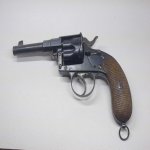The German Imperial Army required a new sidearm to replace the ageing percussion revolvers and single-shot horse pistols still in use at the time. The war between Prussia and France in 1870/71 made both nations realize that their armed forces were inadequately supplied with small arms. The French opted for the M1873 Chamelot Delvigne double-action revolver while the Prussian government adopted a design proposed by the commission (hence "Reichskomissionsrevolver") struck to study the viability of various options. In 1879 there were many powerful and efficient double action revolvers on the international market however the commission favoured the single action, long-barreled M79, as it would become known. This revolver, although heavy and cumbersome to use proved extremely satisfactory. It used a very effective 10.6 x 25mm rimmed cartridge, almost identical to the American .44 Russian. The German “Second Reich” had been founded under Bismarck in 1871, unifying the kingdoms of Prussia, Bavaria, Saxony and Wuerttemberg, under the leadership of Kaiser Wilhelm, and Bismarck as “Reichspraesident”. The new sidearm would be adopted by all units, in all states. The manufacture of the revolvers was shared by four main producers: the Bavarian arsenal at Amberg, the Thuringen arsenal at Erfurt, and privately by the brothers Mauser and the consortium of Schilling & Haenel. They were also made by Sauer, Spangenberg, Dreyse and a few others. The M79 would remain in service well into the early 20th century, even after semi-automatic magazine pistols had become the standard. They were still issued to home guard units as late as 1945.

M79 by Mauserwerke of Oberndorf/Neckar
The M79 was soon followed by an improved, and somewhat smaller (and lighter) M1883 revolver. This one was essentially the same as the M79 except for size and weight. It still utilized the same 10.6 x 25mmR cartridge, and for the first time was also available as a double action revolver. These were rare, and only produced for private sale, many being purchased by officers in the Imperial armed forces. It, too remained in service until the end of the second World War.

M1883 Double Action Officer's Model
The Reichsrevolver, despite its clumsy appearance and heavy construction was popular with the enlisted men and the ordnance department alike. The construction is simple, maintenance in the field is easy, and the gun proved to be rugged and dependable in all possible fighting environments. Today, most of the specimens found on the collector’s market are well-weathered but usually in surprisingly good mechanical condition – an indication that its reputation is well earned. From a legal antique perspective, all the variants of the M79 are antiques, as none were manufactured after 1895 however many of the new model were made as late as 1908. It is important for the collector to examine possible examples closely as not all of them can be proven as antiques. For example, those made by Amberg and Erfurt bear a date of manufacture and the antique status is easily recognizable. Those made by the Schilling & Haenel consortium were all made before 1898 but those by Sauer, Dreyse, Haenel (without Schilling), and Schilling (without Haenel), are not stamped with a date, and could have been made after 1898, and as late as 1908. An inquiry to the RCMP Technical Division is advisable.
The Reichsrevolver continues to be a very popular collector’s item, due to its easy acceptance of the .44 Russian cartridge, and robust construction. It makes for a great shooter, is surprisingly accurate, and is a lot of fun to shoot.

M79 by Mauserwerke of Oberndorf/Neckar
The M79 was soon followed by an improved, and somewhat smaller (and lighter) M1883 revolver. This one was essentially the same as the M79 except for size and weight. It still utilized the same 10.6 x 25mmR cartridge, and for the first time was also available as a double action revolver. These were rare, and only produced for private sale, many being purchased by officers in the Imperial armed forces. It, too remained in service until the end of the second World War.

M1883 Double Action Officer's Model
The Reichsrevolver, despite its clumsy appearance and heavy construction was popular with the enlisted men and the ordnance department alike. The construction is simple, maintenance in the field is easy, and the gun proved to be rugged and dependable in all possible fighting environments. Today, most of the specimens found on the collector’s market are well-weathered but usually in surprisingly good mechanical condition – an indication that its reputation is well earned. From a legal antique perspective, all the variants of the M79 are antiques, as none were manufactured after 1895 however many of the new model were made as late as 1908. It is important for the collector to examine possible examples closely as not all of them can be proven as antiques. For example, those made by Amberg and Erfurt bear a date of manufacture and the antique status is easily recognizable. Those made by the Schilling & Haenel consortium were all made before 1898 but those by Sauer, Dreyse, Haenel (without Schilling), and Schilling (without Haenel), are not stamped with a date, and could have been made after 1898, and as late as 1908. An inquiry to the RCMP Technical Division is advisable.
The Reichsrevolver continues to be a very popular collector’s item, due to its easy acceptance of the .44 Russian cartridge, and robust construction. It makes for a great shooter, is surprisingly accurate, and is a lot of fun to shoot.
















































































